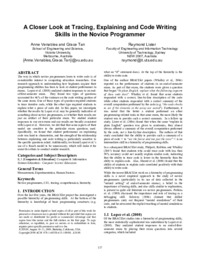A closer look at tracing, explaining and code writing skills in the novice programmer Publikationsdatum:
Zu finden in: ICER 2009 (Seite 117 bis 128), 2009
|
 |
 Diese Seite wurde seit 1 Jahr inhaltlich nicht mehr aktualisiert.
Unter Umständen ist sie nicht mehr aktuell.
Diese Seite wurde seit 1 Jahr inhaltlich nicht mehr aktualisiert.
Unter Umständen ist sie nicht mehr aktuell.
 Zusammenfassungen
Zusammenfassungen
The way in which novice programmers learn to write code is of considerable interest to computing education researchers. One research approach to understanding how beginners acquire their programming abilities has been to look at student performance in exams. Lopez et al. (2008) analyzed student responses to an end-of-first-semester exam. They found two types of questions accounted for 46% of the variance on the code writing portion of the same exam. One of those types of question required students to trace iterative code, while the other type required students to explain what a piece of code did. In this paper, we investigate whether the results by Lopez et al. may be generally indicative of something about novice programmers, or whether their results are just an artifact of their particular exam. We studied student responses to our own exam and our results are broadly consistent with Lopez et al. However, we did find that some aspects of their model are sensitive to the particular exam questions used. Specifically, we found that student performance on explaining code was hard to characterize, and the strength of the relationship between explaining and code writing is particularly sensitive to the specific questions asked. Additionally, we found Lopez et al.'s use of a Rasch model to be unnecessary, which will make it far easier for others to conduct similar research.
 Dieses Konferenz-Paper erwähnt ...
Dieses Konferenz-Paper erwähnt ...
 Begriffe KB IB clear |  Programmieren Programmieren programming
, rainfall problem programming
, rainfall problem
|
 Zitationsgraph
Zitationsgraph
 Zitationsgraph (Beta-Test mit vis.js)
Zitationsgraph (Beta-Test mit vis.js)
 Zeitleiste
Zeitleiste
 10 Erwähnungen
10 Erwähnungen 
- Visual Program Simulation in Introductory Programming Education (Juha Sorva) (2012)


- ICER 2012 - International Computing Education Research Conference, ICER '12, Auckland, New Zealand, September 10-12, 2012 (Alison Clear, Kate Sanders, Beth Simon) (2012)
- How do students solve parsons programming problems? - an analysis of interaction traces (Juha Helminen, Petri Ihantola, Ville Karavirta, Lauri Malmi) (2012)


- How do students solve parsons programming problems? - an analysis of interaction traces (Juha Helminen, Petri Ihantola, Ville Karavirta, Lauri Malmi) (2012)
- Koli Calling 2013 - 13th Koli Calling International Conference on Computing Education Research, Koli Calling '13, Koli, Finland, November 14-17, 2013 (Mikko-Jussi Laakso, Simon) (2013)
- The use of code reading in teaching programming (Teresa Busjahn, Carsten Schulte) (2013)


- Tracing quiz set to identify novices' programming misconceptions (Takayuki Sekiya, Kazunori Yamaguchi) (2013)


- The use of code reading in teaching programming (Teresa Busjahn, Carsten Schulte) (2013)
- ICER 2014 - International Computing Education Research Conference, ICER 2014, Glasgow, United Kingdom, August 11-13, 2014 (Quintin I. Cutts, Beth Simon, Brian Dorn) (2014)
- Koli Calling 2015 - Proceedings of the 15th Koli Calling Conference on Computing Education Research, Koli, Finland, November 19-22, 2015 (Päivi Kinnunen, Judy Sheard) (2015)
- Revisiting rainfall to explore exam questions and performance on CS1 (Antti-Jussi Lakanen, Vesa Lappalainen, Ville Isomöttönen) (2015)


- Do we know how difficult the rainfall problem is? (Otto Seppälä, Petri Ihantola, Essi Isohanni, Juha Sorva, Arto Vihavainen) (2015)


- Revisiting rainfall to explore exam questions and performance on CS1 (Antti-Jussi Lakanen, Vesa Lappalainen, Ville Isomöttönen) (2015)
- Entwicklung und Validierung eines Instruments zur Messung des Wissens über Fehlvorstellungen in der Informatik (Laura Ohrndorf) (2016)


- ICER 2020 - International Computing Education Research Conference, Virtual Event, New Zealand, August 10-12, 2020 (Anthony V. Robins, Adon Moskal, Amy J. Ko, Renée McCauley) (2020)
- Revisiting Self-Efficacy in Introductory Programming (Phil Steinhorst, Andrew Petersen 0001, Jan Vahrenhold) (2020)


- Revisiting Self-Efficacy in Introductory Programming (Phil Steinhorst, Andrew Petersen 0001, Jan Vahrenhold) (2020)
- Debugging im Informatikunterricht (Tilman Michaeli) (2020)


 Anderswo finden
Anderswo finden
 Volltext dieses Dokuments
Volltext dieses Dokuments
 |  A closer look at tracing, explaining and code writing skills in the novice programmer: Fulltext at the ACM Digital Library ( A closer look at tracing, explaining and code writing skills in the novice programmer: Fulltext at the ACM Digital Library ( : :  , 504 kByte; , 504 kByte;  : :  2020-11-28) 2020-11-28) |
 Anderswo suchen
Anderswo suchen 
 Beat und dieses Konferenz-Paper
Beat und dieses Konferenz-Paper
Beat hat Dieses Konferenz-Paper während seiner Zeit am Institut für Medien und Schule (IMS) ins Biblionetz aufgenommen. Beat besitzt kein physisches, aber ein digitales Exemplar. Eine digitale Version ist auf dem Internet verfügbar (s.o.). Aufgrund der wenigen Einträge im Biblionetz scheint er es nicht wirklich gelesen zu haben.










 Biblionetz-History
Biblionetz-History